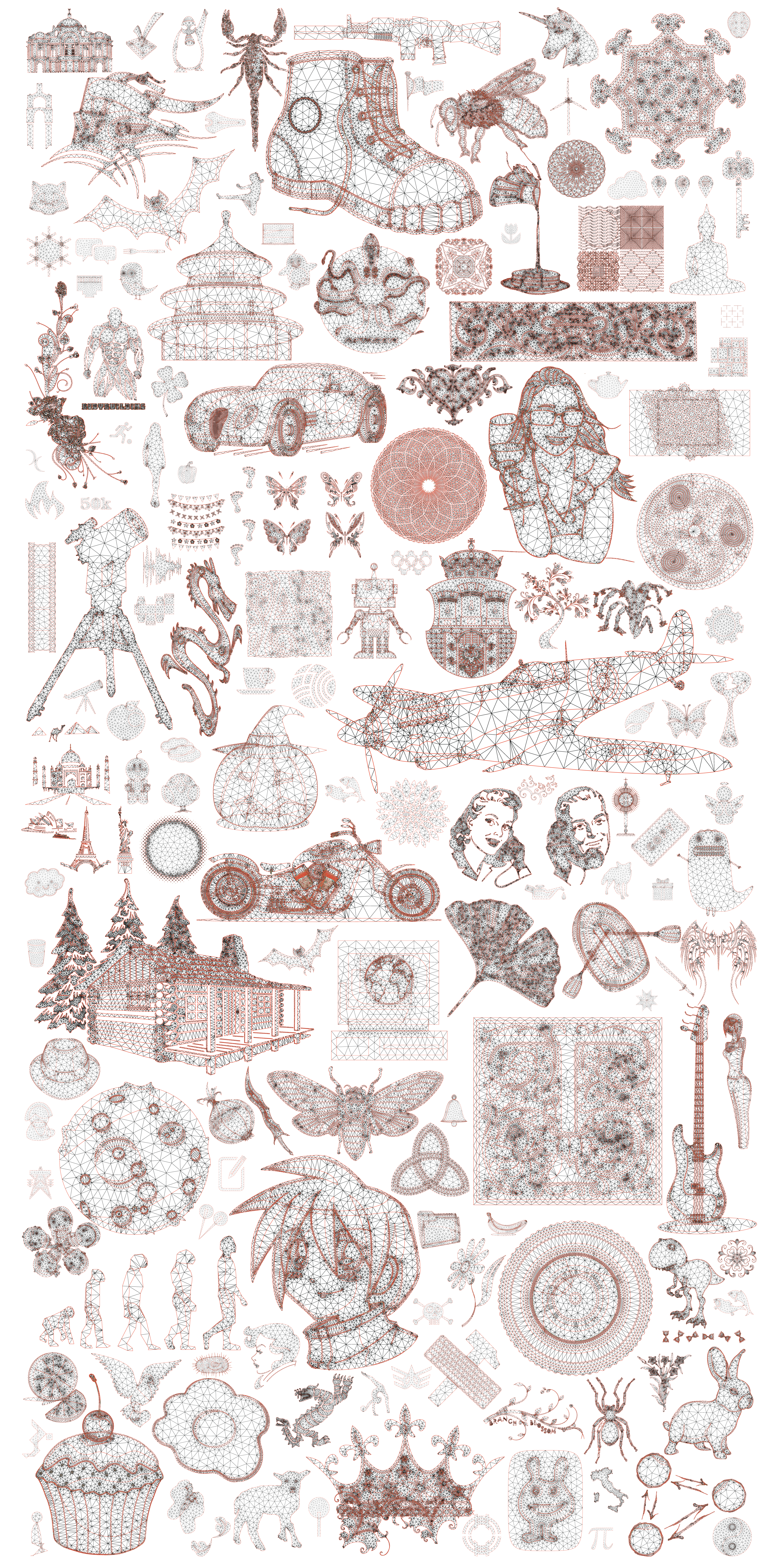 Yixin Hu, Teseo Schneider, Xifeng Gao, Qingnan Zhou, Alec Jacobson, Denis Zorin, Daniele Panozzo.
ACM Transactions on Graphics (SIGGRAPH 2019).
Yixin Hu, Teseo Schneider, Xifeng Gao, Qingnan Zhou, Alec Jacobson, Denis Zorin, Daniele Panozzo.
ACM Transactions on Graphics (SIGGRAPH 2019).
💡💡💡 We also have 3D version of "TriWild" - TetWild! It's the parent of TriWild. TetWild can generate linear tetrahedral meshes robustly and automatically. Check it out 👉 TetWild.
💡💡💡 If you are interested in the algorithm details, please refer to our paper first. We provide plenty of examples and statistics in the paper.
💡💡💡 Check our license first.
Download zip.
💡💡💡Quickly try TriWild on some small exmaples here!!
Input: 19686 meshes (.obj) each with a curved feature file (.json)
(For your reference, here is original 20k SVG images. Those with animation are not converted to obj/json.)
Output with curved constrains: 19685 meshes (.msh)
Output with linear constrains(todo James): 19686 meshes (.msh)
You can use TriWild either by pulling a Docker image or compiling the source code with CMake.
Install Docker and run Docker. Pull TetWild Docker image and run the binary:
docker pull yixinhu/triwild
docker run --rm -v "$(pwd)":/data yixinhu/triwild [TriWild arguments]Our code was originally developed on MacOS and has been tested on Linux and Windows. We provide the commands for installing TriWild in Unix OS:
- Clone the repository into your local machine:
git clone https://github.com/wildmeshing/TriWild- Compile the code using cmake (default in Release mode):
cd TriWild
mkdir build
cd build
cmake ..
make -j- Check the installation:
./TriWild --helpThis command should show a list of TriWild parameters.
Input:
-
Linear constraints (required): segment soup in
.objformat. -
Curved constraints: Bezier curves in
.jsonformat.
Output: Linear/high-order triangle mesh in .msh format.
Please check dataset above for examples.
You can try TriWIld quickly with default parameters by running
./TriWild --input input.obj
for linear constrains, or
./TriWild --input input.obj --feature-input input.json
for curved constrains.
Usage: ./TriWild [OPTIONS]
Options:
-h,--help Print this help message and exit
--input TEXT (REQUIRED) Input segments in .obj format.
--output TEXT Output path.
--postfix TEXT Add postfix into outputs' file name.
--feature-input TEXT Input feature json file.
--stop-quality FLOAT Specify max AMIPS energy for stopping mesh optimization.
--max-its INT Max number of mesh optimization iterations.
--stage INT Specify envelope stage
--envelope-r FLOAT relative envelope epsilon_r. Absolute epsilonn = epsilon_r * diagonal_of_bbox
--feature-envelope-r FLOAT Relative feature envelope mu_r. Absolute mu = mu_r * diagonal_of_bbox
--target-edge-length FLOAT Absolute target edge length l.
--target-edge-length-r FLOAT
Relative target edge length l_r. Absolute l = l_r * diagonal_of_bbox
--log-file TEXT Output a log file.
--min-angle FLOAT Desired minimal angle.
--mute-log Mute prints.
--cut-outside Remove "outside part".
--skip-eps Skip saving eps.
--cut-holes TEXT Input a .xyz file for specifying points inside holes you want to remove.
--output-linear-mesh Output linear mesh for curved pipeline.
More details about some important parameters:
--feature-input
We provide a python script for converting a svg to curves in .json format.
--envelope
Relative surface envelope (1e-3 in default). Absolute surface envelope
, where
is the length of the diagonal of the bounding box of input.
--feature-envelope
Relative feature envelope (1e-3 in default with linear constraints and 2e-3 for curved constraints). Absolute feature envelope
.
--target-edge-length-r
Relative targeted edge length (0.05 in default). Absolute targeted edge length
.
TriWild is MPL2 licensed and free for both commercial and non-commercial usage. However, you have to cite our work in your paper or put a reference of TriWild in your software. Whenever you fix bugs or make some improvement of TriWild, you should contribute back.

